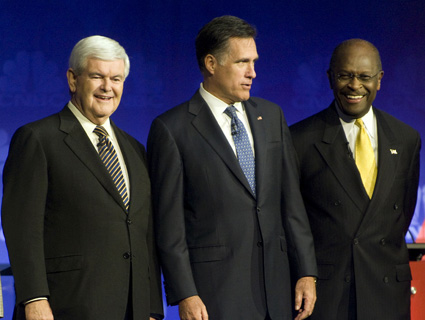 Wang Fengfeng/Xinhua/Zuma Read on for the Mother Jones news team’s instant analysis of Thursday night’s GOP presidential debate in Sioux City, Iowa.
Wang Fengfeng/Xinhua/Zuma Read on for the Mother Jones news team’s instant analysis of Thursday night’s GOP presidential debate in Sioux City, Iowa.
Newt Gingrich’s Freddie Mac Delusions
 Former Speaker Newt Gingrich (bottom right) and the elephant in the room. Photo courtesy of Gingrich Productions.
Former Speaker Newt Gingrich (bottom right) and the elephant in the room. Photo courtesy of Gingrich Productions.
In Thursday night’s Fox News debate, GOP presidential front-runner Newt Gingrich unloaded a whopper when confronted—again—about his controversial consulting gig with government housing corporation Freddie Mac in the late 1990s and 2000s.
At the debate, Gingrich dismissed his work for Freddie Mac. “I was a private citizen engaged in a business like any other business,” he said. Details on his work with Freddie, however, suggest otherwise. Freddie, which was taken over by the federal government in 2008, paid Gingrich between $1.6 million and $1.8 million for consulting work. And although Gingrich has said he was paid to be a “historian” for Freddie, officials with the housing giant told Bloomberg News that Gingrich was hired, in part, to “to build bridges to Capitol Hill Republicans and develop an argument on behalf of the company’s public-private structure that would resonate with conservatives seeking to dismantle it.” So although Gingrich may not have technically lobbied for Freddie, he was hired to open doors in Congress for the company—and he received quite the paycheck for doing so.
Not only did Gingrich consult for Freddie, he also stood fast by its quasi-governmental status, which is anathema to many conservatives in Washington and beyond. Ex-Freddie employees told Bloomberg they didn’t remember Gingrich ever voicing opposition to the company’s business model or strategy. In September 2008, as both Freddie Mac and Fannie Mae teetered on the brink of collapse (they were eventually taken over by the federal government), Gingrich said he had no plans to question Freddie’s business model. “I was perfectly happy to not push the issue as long as they weren’t failing,” he explained at the time. That’s a claim that could come back to haunt Newt. Here’s video of it:
 Mitt Romney/Flickr
Mitt Romney/Flickr
Romney: Obama’s Foreign Policy Is Based on Begging
During the Fox News Republican presidential debate in Sioux City, Iowa, on Thursday night, Mitt Romney was asked about the American spy drone that crashed in Iran nearly two weeks ago. The on-and-off 2012 GOP front-runner was also asked if the Obama administration’s response to the captured drone demonstrated weakness.
“Absolutely,” Romney said. He asserted that the drone incident was just one of many examples of the president handling foreign policy matters with timidity, and that Obama’s lack of “strength” was “inviting war.” With regards to the White House “asking” the Iranian regime to return the downed aircraft, Romney blasted the Obama administration for doing “nothing” and endorsing a “foreign policy based on [saying] ‘pretty please.'”
The former Massachusetts governor had told Fox News earlier this week that, by not retrieving the US drone, President Obama was acting “extraordinarily weak and timid in a critical moment” and argued that he should have ordered American forces to “destroy it or go get it.” This criticism fits perfectly with the narrative he’s been attempting to spin that Barack Obama pursues a policy of “appeasing” our foreign enemies.
Of course, Obama’s decision not to invade or bomb Iran in order to destroy the remains of a drone had absolutely nothing to do with being timid or weak; the decision was based on the recommendation of his entire national security team, plus the advice of top military and intelligence officials. According to the Wall Street Journal, officials weighed the options of “conducting a covert mission inside Iran to retrieve or destroy [the] stealth drone…but ultimately concluded such a secret operation wasn’t worth the risk of provoking a more explosive clash with Tehran”:
The officials considered various options for retrieving the wreckage of the RQ-170 drone.
Under one plan, a team would be sent to retrieve the aircraft. U.S. officials considered both sending in a team of American commandos based in Afghanistan as well as using allied agents inside Iran to hunt down the downed aircraft.
Another option would have had a team sneak in to blow up the remaining pieces of the drone. A third option would have been to destroy the wreckage with an airstrike.
However, the officials worried that any option for retrieving or destroying the drone would have risked discovery by Iran.
“No one warmed up to the option of recovering it or destroying it because of the potential it could become a larger incident,” the U.S. official said. If an assault team entered the country to recover or destroy the drone, the official said, the U.S. “could be accused of an act of war” by the Iranian government.
In other words, the president made a foreign policy move based on prudence, not liberal wimpishness.
Furthermore, it might be worth asking Romney which of these two options he thinks would have a greater chance of “inviting war”: a) not listening to foreign policy hawks every once in a while, or b) ordering something that could actually be construed as a violent act of war.
Newt Gingrich Threatens to Purge Federal Courts
 Pete Souza/Wikimedia Commons
Pete Souza/Wikimedia Commons
Newt Gingrich has a reputation, earned or not, as a man of ideas. And at Thursday’s GOP presidential debate in Iowa, he suggested a big one: borrow a page from Thomas Jefferson and abolish federal courts whose judges have handed down decisions he disagrees with. (He’s previously called for the Ninth Circuit Court of Appeals to be purged.) If nothing else, he’d call liberal judges before Congress to testify.
As Gingrich put it, “The courts have become grotesquely dictatorial, far too powerful, and I think frankly arrogant in their misreading of the American people,” the former House speaker said. “I would, just like Jefferson, Jackson, Lincoln, and FDR, I would be prepared to take on the Judiciary if it did not restrict itself in what it was doing.”
Video, via Think Progress:
Although Jefferson’s clashes with the courts aren’t as well known, Jackson and FDR’s power-grabs have been largely condemned by historians. Gingrich, however, dismissed concerns that dismissing entire courts would unconstitutionally tip the scales on the balance of power: “I would suggest to you, actually, as a historian I may understand this better than lawyers.” (Never mind that Gingrich, who specializes in counterfactual historical novels, is not a historian.)
In Rick Santorum’s World, Scary Muslims Are All the Same
 Gage Skidmore/Wikimedia
Gage Skidmore/Wikimedia
With Ron Paul committing to a characteristically doveish position on a maybe-nuclear-armed Iran, Rick Santorum took the opportunity to bare his teeth, leveling several outrageous claims—albeit ones that will play well to the hawks in attendance—at Thursday night’s debate.
Iran “is a country ruled by the equivalent of Al Qaeda,” Santorum claimed, adding that the Iranian government is a radical theocracy with a commitment to martyrdom. If Iran doesn’t open up its nuclear facilities and close them down, “we will close them down for you,” he promised.
First things first: Al Qaeda is a radical Sunni movement. Iran is a Shiite-majority country; as you may have heard, these two sects don’t exactly get along all the time. And Al Qaeda’s financing has historically come from Sunni-majority countries, most notably Saudi Arabia. In July, the Treasury Department did accuse Iran of facilitating large cash transfers from Middle East donors to Al Qaeda leaders. But any more substantial ties have yet to surface. So what Santorum meant, exactly, when he said Iran is run by Al Qaeda’s “equivalent” is unclear.
If you needed any clearer indication of just how much Al Qaeda is not the equivalent of Iran, review the much-diminished terrorist organization’s stern rebuke to Iranian President Mahmoud Ahmadinejad for his continued insistence on feeding the 9/11-trutherism hype:
In the latest issue of the al Qaeda English-language magazine “Inspire”, an author appears to take offense to the “ridiculous” theory repeatedly spread by Ahmadinejad that the 9/11 terror attacks were actually carried out by the U.S. government in order to provide a pretext to invade the Middle East.
“The Iranian government has professed on the tongue of its president Ahmadinejad that it does not believe that al Qaeda was behind 9/11 but rather, the U.S. government,” an article reads. “So we may ask the question: why would Iran ascribe to such a ridiculous belief that stands in the face of all logic and evidence?”…Iran continues to spread the conspiracy theory, al Qaeda says, because doing otherwise would expose their “lip-service jihad” against the U.S.
Al Qaeda clearly wants to keep the memory of its atrocities alive. You’d think if the group was an Iranian proxy, Ahmadinejad wouldn’t be running around spreading lies about its most important terrorist strike.
Given the opportunity to speak immediately after Ron Paul—a committed noninterventionist—Santorum saw an opening to highlight his hawkishness. In doing so, he conflated two distinctly different, more or less unrelated threats. But for a hawkish audience like Iowa Republican caucus-goers, how much difference will it make?
 Gov. Rick Perry/Flickr
Gov. Rick Perry/Flickr
Perry’s Part-Time Congress: Probably Not a Great Idea
Desperate to strike a nerve with anti-Washington Iowa voters at Thursday night’s debate, Texas Gov. Rick Perry floated an idea he talks about every now and then on the campaign trail: Make Congress part time. Perry proposed slashing for pay for elected officials and their staffs and cutting the amount of time they spend in Washington in half. As a model, he proposed that of the Texas Legislature, which meets for just 140 days total, every two years.
It’s a novel idea. It’s also a recipe for disaster. For one thing, as TPM‘s Benjy Sarlin reported in November, Texas’ part-time Legislature hasn’t done much to make government run smoother. It just puts more power in the hands of Rick Perry:
“It’s just really hard for the legislature get things done when your government is run by a hundred boards and commissions appointed by a governor who has next to no voice in the legislature,” Bob Stein, a professor of political science at Rice University, told TPM.
“They give the governor a lot of power. Even with Republicans with large majorities, the chairman of finance couldn’t move anything without the governor’s blessing.”
Given the GOP’s crusade against President Obama’s “czars,” advocating that the executive branch have more discretion to fill key slots is an odd position for Perry to take (in Texas, he’s also come under fire for stacking those aforementioned boards with top donors). It also offers a solution to a problem that doesn’t exist—namely that members of Congress (and their staffs) are overpaid and lazy. Generally speaking, they work insanely long hours doing very difficult work, handling a set of responsibilities that have significantly expanded even as the size of Congress has hardly budged. In other words, the problem isn’t the pay; it’s the personnel.
Newt’s Balanced Budget Claim Doesn’t Add Up
Questioned by Fox News’ Bret Baier on his conservative credentials at Thursday’s GOP debate in Iowa, Newt Gingrich made a curious claim: As speaker of the House, he said, he’d balanced the federal budget four times. It’s a claim he’s made before—in a video on his campaign website, and on the stump. But as PolitiFact notes, it’s false: Although Congress did pass balanced budgets for four straight years beginning in the late 1990s, the latter two came after Gingrich had resigned from the House and he’d played no part in crafting them.
Per PolitiFact:
The federal budget runs on a fiscal year calendar that begins October 1 and ends September 30. During fiscal years 1996 and 1997—the first two that Gingrich helped shape as speaker—there were deficits, of $107 billion in 1996 and about $22 billion in 1997.
By fiscal year 1998, the federal budget did reach a surplus of $69 billion. And in fiscal year 1999—which Gingrich can claim some responsibility for, even though he was out as speaker for most of the fiscal year—it was in surplus as well, to the tune of $126 billion.
But that’s only two balanced budgets he can claim credit for. The federal government did run four consecutive surpluses, but for the last two of those—fiscal years 2000 and 2001—Gingrich was no longer serving in the House.

















